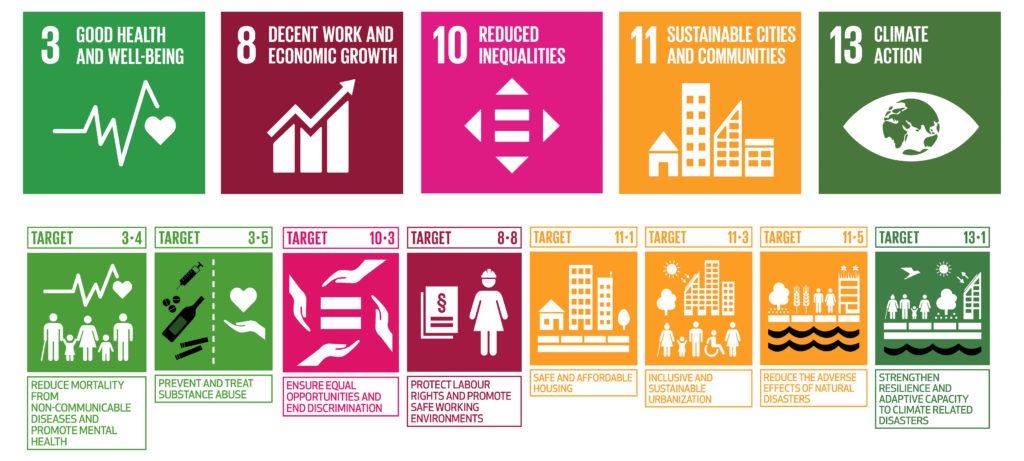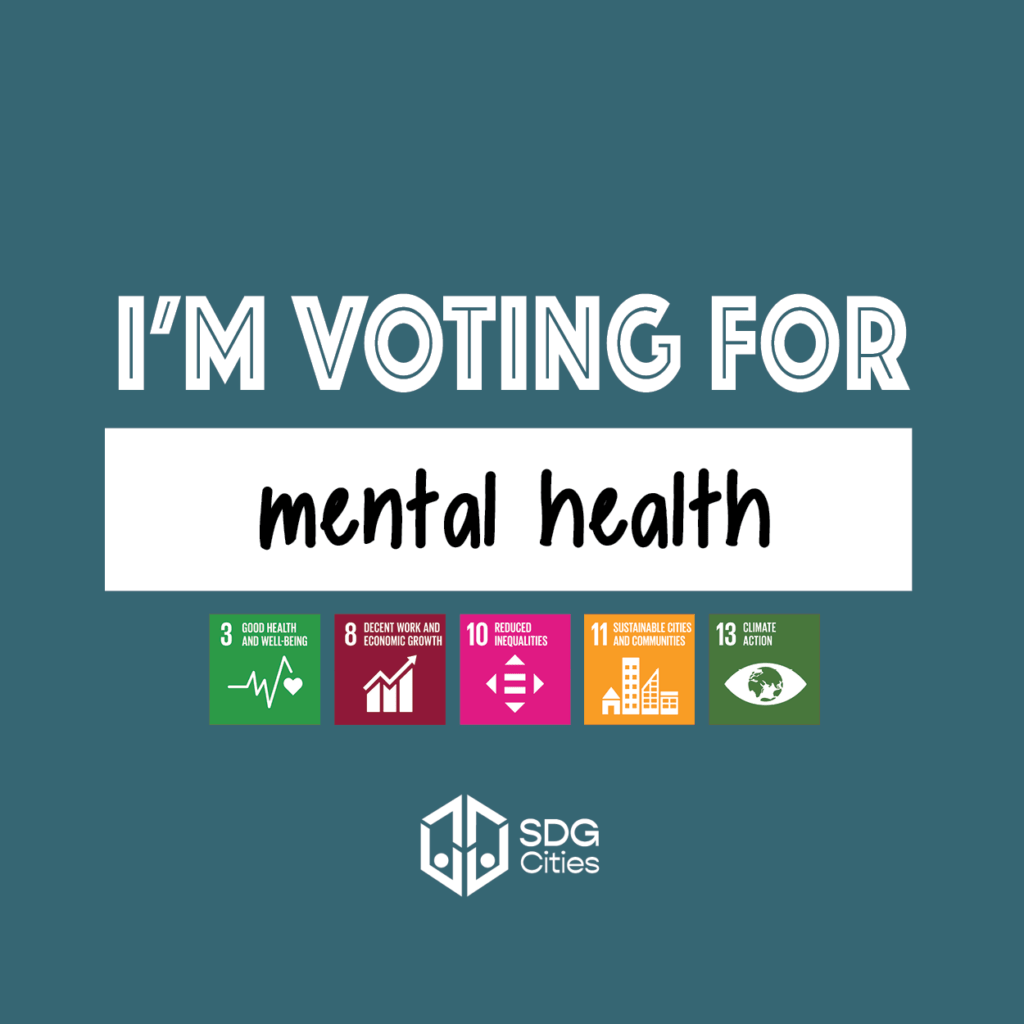Vote 4 the SDGs: Mental Health
The UN Sustainable Development Goals (SDGs) are universal, target oriented and interconnected. They provide clear objectives that can help us hold our governments and elected officials accountable, measure progress and act as a common language as we work for change across sectors. This Vote 4 the SDGs series aims to engage community members about important issues and situate them within the SDG framework. We aim to promote productive conversations about the issues that matter – and help inspire solutions for a just and sustainable future for all.
Are you voting for mental health?
May 2-8th is the 71st Annual Canadian Mental Health Association (CMHA) Mental Health Week. With the provincial election approaching, this week of awareness raising and resource sharing offers an opportunity to explore what the provincial government can do to address the mental health crisis facing Ontario.
Voting for mental health means voting for investments in mental healthcare that recognize the unique needs of vulnerable individuals and provide access to the mental health support they need, when they need it.
Relevant goals and targets from the UN Sustainable Development Goals (SDGs)
Mental health is recognized in the SDGs as it relates to wellbeing, worker safety, housing, inclusivity, discrimination and climate change. These connections recognize the burden of mental illness and the need to support the mental health of all people as a priority for sustainable development.

The group FundaMentalSDG has called for more comprehensive mental health indicators that consider the number of people with severe mental health disorders. This additional metric aims to increase awareness and access treatment. (Source)
Is the Mental Health Crisis Really a Crisis?
In any given year, 1 in 5 Canadians experience a mental illness with 1 in 2 reporting they have or have had a mental illness by the time they reach age 40 (Source). In Canada, nearly 500,000 workers are prevented from attending work each week due to mental illness (Source). Overall, the economic burden of mental illness in Canada is an estimated $51 billion per year including health care costs, lost productivity and reductions in health-related quality of life (Source).
Evidence indicates that healthcare related costs are lowered when mental illness and substance use problems are identified and dealt with effectively, with a focus on prevention (Source). However, roughly half of Canadians live in places that are underserved by psychiatric care (Source). In Ontario, lack of access to mental health prevention and treatment services is a growing problem. In their 2022 budget submission, Addictions and Mental Health Ontario (AMHO) highlighted significant wait times for services as a serious problem. In Guelph, for example, wait times are as high as 313 days for treatment and counseling (Source). Wait times for supporting housing, which is a critical support for mental health and addictions, in cities like Toronto, Kitchener, Ottawa and London are as high as 4 or 5 years (Source).
Impacts of Covid-19 and Mental Health
Employment loss, social isolation and other disruptions caused by the Covid-19 pandemic have further impacted mental health. A survey conducted during the pandemic found that during a public health crisis, health care workers’ mental health is impacted due to an increased risk of infection, high workloads affecting work–life balance, and issues involving the supply of personnel protective equipment (PPE) (Source). .
Similar to the health, economic and social impacts of the pandemic, mental health impacts are gendered (Source). The increased stress and anxiety from balancing employment, childcare and household duties has disproportionately impacted women, particularly single mothers, working women and racialized women (Source).
Mental Health Care for Children and Youth
Young people aged 15 – 24 are more likely to experience mental illness and substance abuse disorders (Source). It is estimated that 75% of children with mental health disorders in Canada do not have access to specialized treatment services. Indigenous children and youth who face an increased risk of severe mental illness are also impacted by lack of access to treatment and support (Source).
The Centre for Addictions and Mental Health (CAMH) conducted a survey of more than 600 young people between the ages of 14 and 27 and found a statistically significant deterioration in their mental health pre and post pandemic (Source). Prolonged school closures have upended life for children and their families and resulted in significant mental health impacts for young people.
Climate Change and Mental Health
The most recent report from the Intergovernmental Panel on Climate Change highlighted not only the urgency for climate action – but also the links between climate change and mental health. Mental health challenges associated with climate change will not be felt equally. The IPCC points out that certain groups are more vulnerable — for instance, farming communities, whose livelihoods are directly threatened by extreme weather. Indigenous communities will also face greater challenges from the disruption to ecosystems they rely on for their food, culture and social ties (Source).
The Centre for Addictions and Mental Health (CAMH) has also published research that highlights the connection between housing, climate change and mental health (Source). Increasingly frequent extreme weather conditions and major weather events are putting vulnerable people – including those with serious mental illnesses – at risk. Increasing access to affordable and supportive housing for people with serious mental illnesses, and connecting strategies for addressing housing, climate change and mental health are all essential paths forward.
How can we improve access to mental health support in Ontario?
Addictions and Mental Health Ontario (AMHO) provide policy recommendations for a Stronger System of mental health and addictions support in Ontario. Importantly, a stronger system, with better and more inclusive services with a focus on supporting Black and Indigenous peoples as well as trans people and other members of the LGBTQ2IA+ community. Policies that recognize and provide targeted support for individuals and communities who are at increased risk of mental illness and who face barriers to healthcare access are critical.
The AMHO submission for the 2022 budget called on the Ontario Government to:
- Implement a strategy to address growing wait times for mental health, addiction, and substance use health services.
- Develop and implement a Health Human Resources plan to address the staffing challenges in the sector.
- Respond urgently to the escalating overdose crisis and the drastic rise in overdose deaths.
- Use a social determinants of health approach in designing and implementing mental health and substance use supports and services.
CMHA Ontario has launched the I Choose campaign to raise awareness about the policy changes and investments needed to support mental healthcare in Ontario. Leading up to the election CMHA will share resources and policy recommendations related to mental health and addictions care. Their work has highlighted the need for increased investments in community-based mental health and addictions care and support to prevent burnout amongst mental health and addictions workers. More resources will be shared in the coming weeks at ichoose.ca.
Resources:
Canadian Mental Health Association. Mental Health Week https://www.mentalhealthweek.ca
FundaMentalSDG. Indicators for Mental Health https://www.fundamentalsdg.org/indicators-for-mental-health.html
The Centre for Addiction and Mental Health. Mental Illness and Addiction: Facts and Statistics. https://www.camh.ca/en/driving-change/the-crisis-is-real/mental-health-statistics#:~:text=Prevalence,Canadians%20experiences%20a%20mental%20illness.&text=By%20the%20time%20Canadians%20reach,have%20had%20%E2%80%93%20a%20mental%20illness.
The Centre for Addiction and Mental Health. The Mental Health Crisis is Real. https://www.camh.ca/en/driving-change/the-crisis-is-real
The Centre for Addiction and Mental Health. Prevention & Policy. https://www.camh.ca/en/science-and-research/research-areas/prevention-and-policy
Addictions and Mental Health Ontario. No Time to Wait, Budget Submission 2022. https://amho.ca/wp-content/uploads/AMHO_BudgetSubmission_2022_FINAL.pdf
Statistics Canada. 2021. Mental health among health care workers in Canada during the COVID-19 pandemic. https://www150.statcan.gc.ca/n1/daily-quotidien/210202/dq210202a-eng.htm
Ontario Medical Association. May 2021. Responding to a Mental Health and Addiction Tsunami. https://www.oma.org/uploadedfiles/oma/media/public/backgrounder-responding-to-a-mental-health-and-addiction-tsumani.pdf
The Centre for Addiction and Mental Health. Pandemic impacting the mental health of young people in Ontario. https://www.camh.ca/en/camh-news-and-stories/pandemic-impacting-the-mental-health-of-young-people-in-ontario
Intergovernmental Panel on Climate Change. Climate Change 2022: Impacts, Adaptation and Vulnerability. https://www.ipcc.ch/report/ar6/wg2/
The Centre for Addiction and Mental Health. February 2022. Housing and Mental Health Policy Framework. https://www.camh.ca/-/media/files/pdfs—public-policy-submissions/housing-policy-framework-pdf.pdf
Addictions and Mental Health Ontario. August 2021. Building An Equity, Anti-Racism & Anti-Oppression Framework For Addictions & Mental Health. https://amho.ca/wp-content/uploads/AMHO_EARAO_FrameworkReport_FINAL.pdf
Addictions and Mental Health Ontario. Snapshot:Trans-inclusion in Mental Health and Addictions Services. https://amho.ca/wp-content/uploads/Trans-Inclusion-Snapshot_FINAL.pdf

